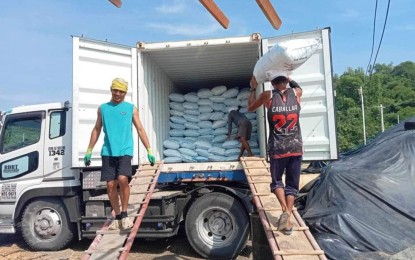
DELIVERY. Workers load bags of agricultural-grade salt fertilizer at the Pangasinan Salt Center in Barangay Zaragosa Bolinao town, Pangasinan in this undated photo. Pangasinan is now supplying salt fertilizer to Albay, Iloilo, Cebu, Leyte, and Davao through a private contractor. (Photo courtesy of Province of Pangasinan)
MALASIQUI, Pangasinan – The Pangasinan Salt Center is set to supply 2 million kilograms of agricultural-grade salt fertilizer to Albay, Iloilo, Cebu, Leyte and Davao, through a private contractor.
This is aside from the 4,180 bags of 50-kilo agricultural-grade salt fertilizer being supplied by the provincial government-managed salt farm in Barangay Zaragosa, Bolinao town to the Ilocos, Cagayan, and Central Luzon regions this year through the Philippine Coconut Authority (PCA), Assistant Provincial Agriculturist Nestor Batalla told the Philippine News Agency in a phone interview on Thursday.
“We have delivered around 2,000 bags (50-kilos per bag) through a trucking service to the regions in Visayas and Mindanao,” he said in Filipino.
Batalla said the salt produced by the farm met the requirement of the PCA, with its 55 percent salinity or sodium chloride content and 12 percent moisture content, and the private contractor winning bidder got the supply from the province's salt farm.
“Salt produced in Pangasinan is high in sodium chloride and has undergone analysis before the notice to proceed will be issued by PCA,” he said.
Batalla said the salt center has produced around 6 million kilos of salt since its operation under the provincial government started in November last year up to June this year.
“We still have ample supply for other buyers,” he said, adding that the hot season was favorable for the salt production although it was not to the crop farmers.
Salt production in the center will again start in October, he said.
The provincial government has been in an interim management strategy for the improvement and development of the salt farm through a memorandum of agreement with the Department of Environment and Natural Resources in December 2022 to increase production.
The coconut fertilization project of the PCA intends to enhance coconut productivity by involving the rehabilitation of low-bearing palms through the application of agricultural grade salt fertilizer, the Pangasinan Provincial Information Office said.
Pangasinan Governor Ramon Guico, in a statement issued earlier, said the establishment of the Pangasinan Salt Center was in support of President Ferdinand R. Marcos Jr.’s “Philippine Salt Industry Development Act,” which aims to strengthen and revitalize the salt industry in the Philippines.
It is also a response to the President’s call to resolve the salt crisis in the country.
Amid the Philippines being an archipelago, 93 percent of the country's salt requirement is being imported from China and Australia.
“We need to drastically reduce our dependency on imported salt and produce 100 percent of our consumption needs. We must even think of becoming a net exporter of salt in the future,” Guico said. (PNA)
